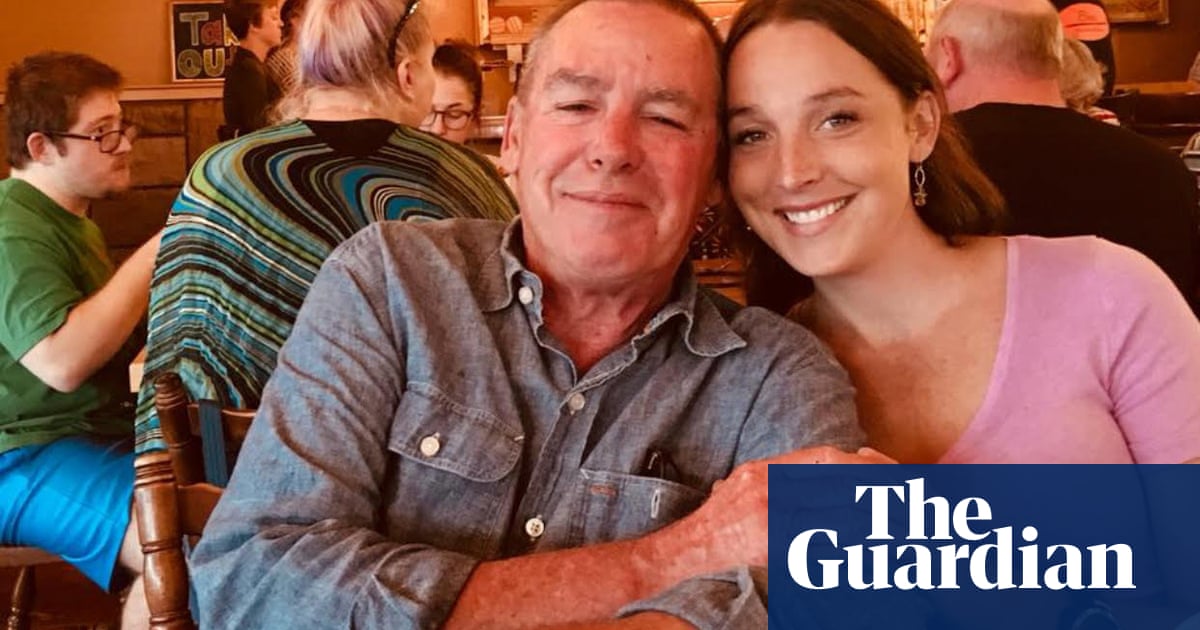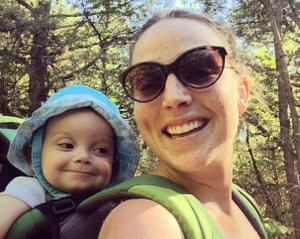
[ad_1]
Kate O’Neill never thought she would be writing her own sister’s obituary. But as the family made preparations for the memorial this month, the task fell to O’Neill. Sitting down at a kitchen table, she wrote the story of how Madelyn Ellen Linsenmeir battled drug addiction.
Linsenmeir, from Burlington, Vermont, was only 30 when she died on 7 October, leaving behind a three-year-old son and a family who wants to honor her by relaying the realities of drug addiction.
“It is impossible to capture a person in an obituary, and especially someone whose adult life was largely defined by drug addiction,” the obituary, which has since gone viral, reads. “To some, Maddie was just a junkie – when they saw her addiction they stopped seeing her. And what a loss for them. Because Maddie was hilarious, and warm, and fearless, and resilient.”
Linsenmeir tried OxyContin for the first time at a high school party when she was 16. By 18, she was using heroin.
Living in and out of rehab, losing custody of her son, and ultimately dying in a hospital while in police custody, Linsenmeir’s story is a raw one, felt and known by millions of Americans who struggle with addiction amid America’s opioid crisis.
Interviews with family, friends and Linsenmeir’s recovery program mentor also paint a picture of a woman beloved for her kindness, perseverance and honesty.
O’Neill told the Guardian she didn’t consider writing the obituary any other way “because [the addiction] was a disease”, she said. “Leaving it out wouldn’t have been an authentic authoring of her life.”
She described Linsenmeir going to jail and not having immediate treatment available. “People are going to jail because they’re committing crimes to serve their addiction, and they’re going to jail as addicts and not receiving treatment,” O’Neill said.
Linsenmeir struggled to stay sober, especially when her son Ayden was born in 2014. Sometimes, she succeeded.
“When she had Ayden, she tried really hard to maintain her sobriety so she could parent him. She was strong-willed and resilient, but the disease was stronger than she was,” O’Neill said. Linsenmeir was clean for six months, and lost custody. Then she was clean for another 11 months. Her efforts to be the best mother she could be to her son were noticed by her family, and by her own mentor.
Jill St Thomas-Benoit knew Linsenmeir for over a decade as her mentor and friend in 12-step recovery programs.

“I was so happy to see her shine with her son. She was made to be a mom,” St Thomas-Benoit said. When Linsenmeir died, she was “crushed, but not surprised. Not because of her character, but because the disease is so cunning and powerful.”
Linsenmeir was dedicated to the 12 steps, with St Thomas-Benoit describing one scenario where she asked her mentor to drive her to police to turn herself in for an outstanding warrant “because she knew it was the right thing to do”.
Drug-free for over 15 years herself, St Thomas-Benoit said recovery is a daily struggle for addicts.
She said usage mainly starts with pharmaceuticals for pain management or recreational use in a party. St Thomas-Benoit calls the opioid crisis a “monster created by big pharma”. Of her high school class of 1988 in Winthop, Massachusetts, 30 people have died from their addictions.
According to the Centers for Disease Control and Prevention, there were more than 63,000 overdose deaths in the United States in 2016, a rise of 21% in just one year. One hundred and one of those deaths were in Vermont.
Burlington police departmentchief Brandon del Pozo has taken the task of ending the opioid epidemic to heart.
At 11.30pm one night after Linsenmeir’s death, del Pozo wrote a now viral Facebook post reacting to her obituary.
“I have a problem with this obituary,” he wrote. “It’s a much better obituary than the rest of us deserve.”
Del Pozo told the Guardian that he saw People magazine write about Linsemeir, and it was a tipping point for him that night.
“Why did it take a grieving relative with a good literary sense to get people to pay attention for a moment and shed a tear when nearly a quarter of a million people have already died in the same way as Maddie as this epidemic grew?” he wrote.

He insists that medical protocols to reducing the risks of death by overdose are the best solutions to widespread addiction. He suggested giving out buprenorphine at emergency rooms and at needle exchanges to users, and treating every prisoner who needs it with the drug, and stopping arrests and prosecutions for simple misdemeanor-level possessions of non-prescribed addiction treatment medications, policies currently being implemented at Burlington-area hospitals and prisons.
Del Pozo and St Thomas-Benoit pointed to Rhode Island’s state policies as an example of the right path to combatting opioid deaths. The state saw a 303% increase in overdose fatalities from 2011 to 2016. But a massive effort led by the state, Johns Hopkins University, corrections and other groups cut drug overdose deaths involving opioid fentanyl by more than 60% since 2016.
More than $2m is being spent a year to provide medication assisted opioid addiction treatment for incarcerated addicts. This, Del Pozo said, is the kind of programming that needs to happen across the country.
He and O’Neill both hope the attention brought to Linsenmeir’s obituary should not be in vain.
O’Neill said it was easier for people to empathize with her sister when the obituary was accompanied by a Facebook picture of her that was taken “at her very best”. But she said addiction has many faces, and “some of those faces are ugly”.
“Our empathy needs to extend to everyone with this disease,” she said, calling on people in the healthcare, corrections, and courts systems to stop contributing to the “shame and stigma” of drug addiction.
In Burlington, Turning Point Center is a place where Linsenmeir sought support services and utilized their mother’s recovery program. Her family has asked that in lieu of flowers, donations be made the facility.
Executive director Gary De Carolis said that because of the impact of her obituary, he has been getting notifications about donations “every few minutes” from people all over the world, as far away as Denmark.
“It put a real face on people,” he said. ‘“Instead of ‘this is an addict, this is a junkie’ – those stereotypical and stigmatizing labels, you can see the beauty of Maddie’s life and her skills. This has resonated all over the world.” Turning Point had more than 230 donations as of Thursday afternoon, with more than $11,000 raised.
Source link